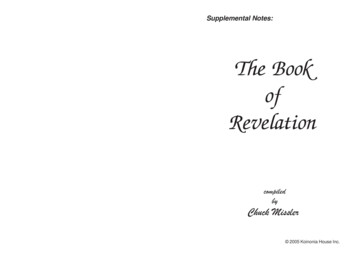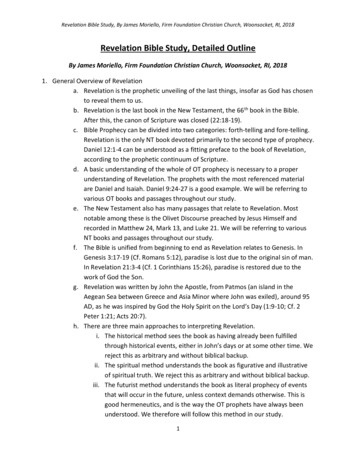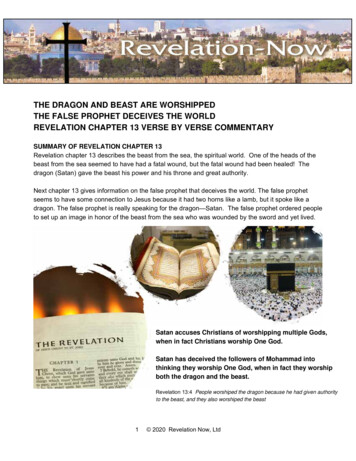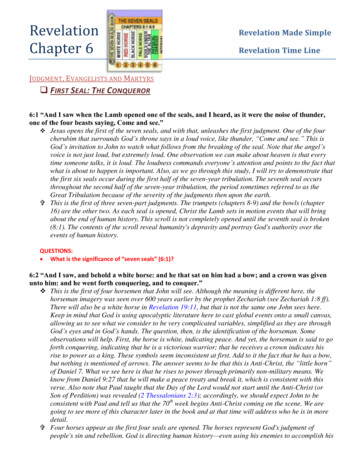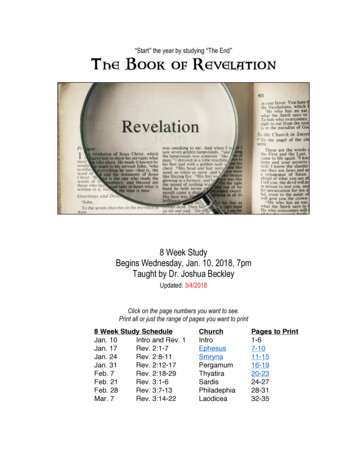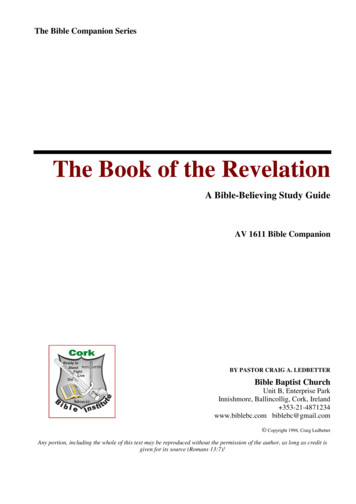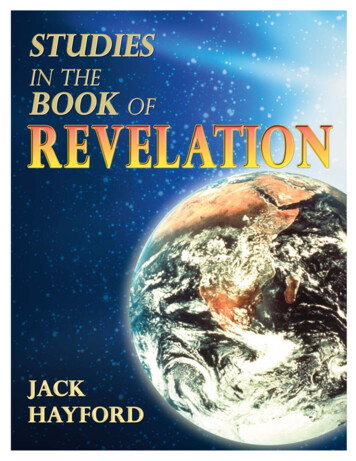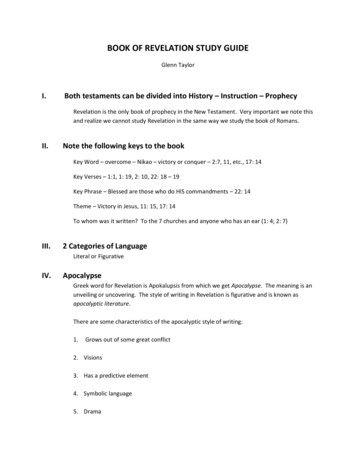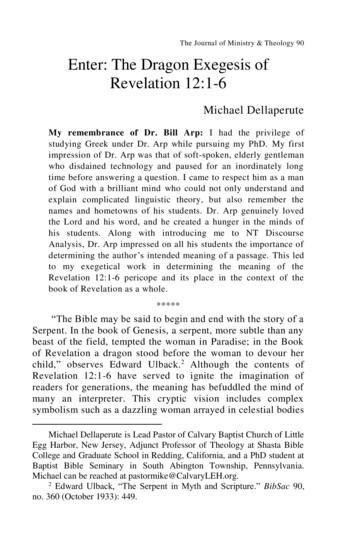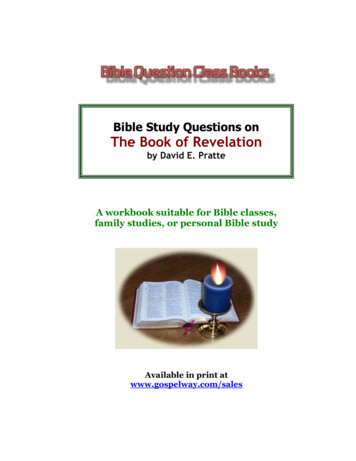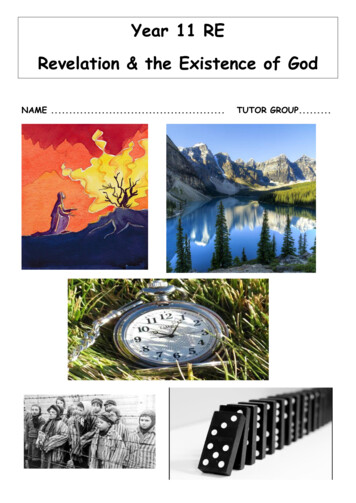
Transcription
Year 11 RERevelation & the Existence of GodNAME .TUTOR GROUP.
THEME C: THE EXISTENCE OF GOD AND REVELATION1. The Design ArgumentEssential information: The Design Argument says that because everything in the universe is sointricately made, it must have been created by God. Therefore God exists Jews and Christians are theists. They believe that God planned and created theuniverse. Atheists believe that the universe was not created but evolvednaturally. Agnostics believe there is not enough evidence that God exists or not,or that God created the universe or notDraw an image or object to help you rememberthese key terms TheistAtheistAgnostic
Different versions of the Design ArgumentWilliam Paley Isaac Newton Thomas Aquinas F. R. Tennant
Explain the Watch analogy inyour own words Religious views on the Design ArgumentJewish viewsChristian viewsWhy might some people object to the Design Argument?2.The First Cause ArgumentEssential information: The First Cause Argument or Cosmological argument states that there has tobe an uncaused cause that made everything else happen
The logical chain of reasoning for the First Cause argument runs like this Everything thatAs the universeThere must be somethingexists or beginsexists and had aexisting with no cause, whichto exist mustbeginning, it toois eternal (has no beginning orhave a causemust have aend) to cause everything elsecausethat existsThis means GodThe eternal firstmust existcause can only be GodCover the above information and complete the boxes below
The key assumption in the First Cause argumentsis that the universe had a starting point or cause,like all other things that exist. Christians andJews say the starting point was God, who set a chain of events into motion thatcreated the universe. Theists asks what existed before the Big Bang. They believethe answer is God. As God is eternal, he has no starting point.Christian views about the First Cause argument – Thomas AquinasAquinas argued that Jewish views about the First Cause argument – Rabbi Bachya ben JosephRabbi Bachya argued that What are the possible objections to the First Cause argument?Some people will object to the First Cause argument because
3. The argument from miraclesEssential information: Miracles are seemingly impossible events that cannot be explained by natural orscientific laws Theists believe miracles are the action of God and prove his existence. Theyshow God’s love and help to strengthen a believer’s faithArguments from miracles and objections to itTheists argue that: If there is no scientific explanation for an event, it must be caused bysomething outside nature. God is the only thing that exists outside nature. These events must be the result of God’s intervention in the world. Therefore God must exist.Atheists and agnostics may argue that: Miracles are no more than luck coincidences They may have scientific explanations we don’t yet know about. Miracle healings could be the result of mind over matter or misdiagnosis. Some miracles are deliberately made up for fame or money Therefore what appears to be a miracle have nothing to do with God, sothey cannot prove God exists.
What does David Hume say about Miracles?How might a Theistrespond to this account?How might an Atheistrespond?Christian responses to miracles Jewish responses to miracles
4. Further arguments against the existence of GodEssential information: Some people use science and he existence of sufferingand evil to challenge the existence of God. Jews and Christians respond by saying there does not have to be aconflict between religion and science, and that evil and suffering existbecause of free will.Examples of naturalevilExamples of moral evilEvil and suffering as an argument against theexistence of GodAtheist argue that the existence of evil andsuffering proves God does not exist because:
Jewish responses to the problem of eviland suffering Christian responses to the problem ofevil and suffering How science is used to challenge the belief in GodWhat are some of the reasons how science is used to challenge belief in God?Jewish responseChristian response‘Science takes things apartto see how they work.Religion puts things togetherto see what they mean.’Rabbi Jonathan Sacks‘Evolutionary theory, properly understood, is not incompatible with belief in aDivine Creator, nor with the first 2 Chapters of Genesis.’ Rabbinical Council ofAmerica
‘We are, first, commanded to survive as Jews, lest the Jewish people perish. We arecommanded, secondly, to remember in our very guts and bones the martyrs of theHolocaust, lest their memory perish. We are forbidden, thirdly, to deny or despair ofGod, however much we may have to contend with him or with belief in him, lest Judaismperish. We are forbidden, finally, to despair of the world as the place which is to becomethe kingdom of God, lest we help make it a meaningless place in which God is dead orirrelevant and everything is permitted. To abandon any of these imperatives, in responseto Hitler’s victory at Auschwitz, would be to hand him yet other, posthumous victories.’Emil Fackenheim (Jewish philosopher and Reform Rabbi)5. Special revelation and enlightenmentEssential information: Most religious people believe there is supreme, final, fundamental power in allreality, an ultimate reality. This ultimate reality could be a God or gods, whichare referred to as being divine. Special revelation is God making himself known through direct personalexperience Special revelation and enlightenment are both sources of knowledge about thedivineMoses and the burning bush
How may God be known? – General and Special revelationTypes of special revelation: hearing God’s call, dream, vision, prophecy and miracleChristianity: explain the meaning ofJudaism: explain the meaning ofspecial revelation and give twospecial revelation and give twoexample. How does each one lead toexamples. How does each one lead tobelief in God?belief in God?
What are the alternative explanations for special revelation and visions?What do Buddhists believe about the enlightenment?You might be asked to compare beliefs on visions between Christianity (the mainreligious tradition in Great Britain) and another religious tradition6. General revelationEssential information: Some seek to understand the divine by using general revelation – God makinghimself known through ordinary experiences. These ordinary experiences couldbe through nature or scripture.
From the passage on the previous page, what are the FOUR ways in whichpeople can get general revelation?Nature as a way of understanding the divine“How many are the things You havemade, O LORD; You have made them allwith wisdom; the earth is full of Yourcreations.” Psalm 104;24 (Tenakh)Why might Jews believe that nature reveals thedivine?Why might Christians believe that nature reveals the divine?Why might Atheists and humanists object to the view that nature reveals the divine?
Scripture as a way of understanding the divineBoth Jews and Christians believe that scripture reveals what God is like, how Godacted in the past, and how God wants people to live. It is another form of generalrevelation. In both the Tenakh and the Bible, God’s nature is revealed as powerful,loving, just, forgiving and transcendent.For Jews, there are TWO main ways of using or reading scripture (the Tenakh):Liberal Jews will say While Orthodox Jews will say For Christians, there are two ways of reading scripture (the Bible) too While Fundamentalist Christian will say Liberal Christians will say Some people (Atheist and Humanists) might object to the use of scripture tounderstand the divine because
7. Different ideas about the divineEssential information: Religions have different ideas about the divine Christianity and Judaism see God as omnipotent, omniscient, benevolent,personal, impersonal, immanent and transcendentWhat are the qualities of God portrayedin this painting by Michelangelo?The limitations of language make describing a God without limits very difficult.However, certain terms can be used to help describe God’s nature.Cover the key terms and try and remember theirmeaning write them down.Omnipotent Omniscient Benevolent Immanent Transcendent Personal nature (of God) Impersonal nature (of God)
Can God be both personal and impersonal, immanent and transcendent?“You have searched me“For God so loved the“I am the Lord and thereLord and you know me.world that he gave hisis none else, I form lightYou know when I sit andonly Son, that whoeverand darkness, I make wealwhen I rise; you perceivebelieves in him shall notand create woe – I themy thoughts from afar.”perish but have eternalLord do all these things.”(Psalm 139; 1-2)life.” (John 3; 16)(Isaiah 45; 6-7 [Tenakh)How might Jews respond to thisHow might Christians respond to thisquestion?question?8. The value of revelation and enlightenmentEssential information: Theists believe that revelation and enlightenment are valuable sources ofknowledge about the divine Revelations are difficult to prove because they are subjective, personalexperiences. What some theists may regard as revelations, non-theists mayunderstand in other waysIndividual revelations have a great impact on the lives of those who receive them,even to the extent that they change their religious thinking completely.
What does thisstory show aboutthe value ofrevelation?Revelation: reality or illusion?Revelation cannot be proved, so how do believers know it is real? They may askthemselves these questions:QuestionDoes theirrevelation matchthe real world?Religious responsesThe more the revelation aligns with what actually happens,the more likely it is to be real. For example, a revelation thatclaims people can fly is unlikely to be believed. A revelationthat claims the water in a holy place can cure, and it thendoes, is more likely to be real.Does I fit withother revelationsaccepted by areligion?If it contradicts a long-held belief of a religion, it is lesslikely to be a true revelation. However, beliefs may changeover time (e.g. about slavery or homosexual relationships) sothis is not always the case.Does it change thefaith or the life ofthe person?God’s revelation to Abraham caused him to abandon his beliefin idols, follow the one God and travel to Canaan to establishthe Jewish nation. Such revelations are more likely to beaccepted as true because they have such a powerful influenceon a person’s life.Does it contradictthe sacred text?Different religions offer different paths to the divine.Within a faith there are different interpretations of sacredtexts and how these apply to moral issues. If a particularinterpretation or revelation disagrees with another verse inthe Bible/Tenakh, then the interpretation or revelation maybe questionable.
How might some people object or disagree to revelation as a way of knowing thedivine?Exam Practice Questions Give two weaknesses of the First Cause argument (2marks)Give two possible causes of suffering (2marks)Explain two contrasting beliefs in contemporary British society about the Designargument for God’s existence. In your answer you must refer to one or more religioustraditions. You may refer to a non-religious belief. (4marks)Explain two contrasting beliefs about miracles (4marks)Explain two similar beliefs about general revelation (4marks)Explain two religious beliefs visions. Refer to sacred writings or another source ofreligious belief and teaching in your answer. (5marks)Explain two religious beliefs about special revelation. Refer to sacred writings oranother source of religious belief and teaching in your answer. (5marks)Explain two religious beliefs about God. Refer to sacred writings or another source ofreligious belief and teaching in your answer. (5marks)Evaluation questions (12marks)‘The First Cause argument proves that God exists’‘Evil and suffering proves that God does not exist’‘Miracles prove that God exists’‘It is easier to think of God as personal rather than impersonal’In your answer you: Should give reasoned arguments in support of this statement Should give reasoned arguments to support a different point of view Should refer to religious arguments May refer to non-religious arguments Should reach a justified conclusion
universe. Atheists believe that the universe was not created but evolved naturally. Agnostics believe there is not enough evidence that God exists or not, or that God created the universe or not Draw an image or object to help you remember

